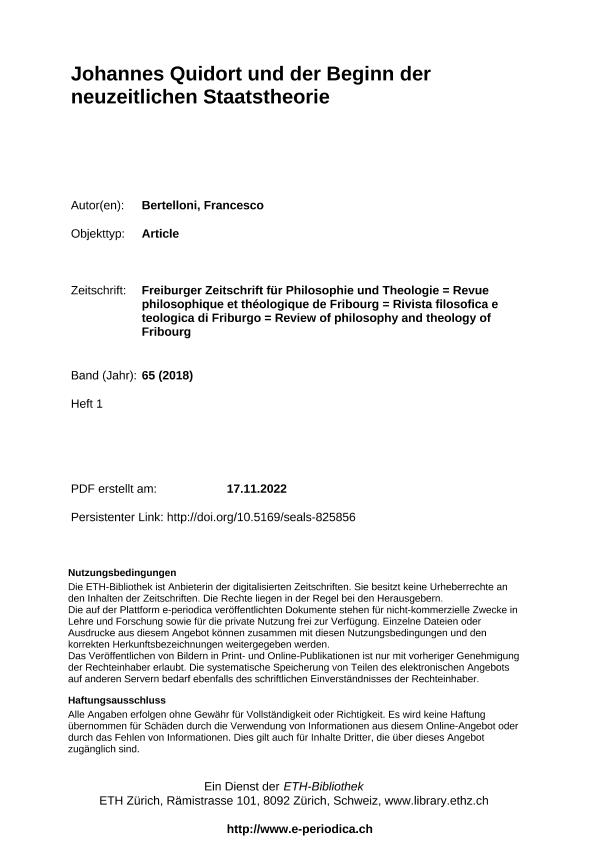Artículo
Der Traktat De potestate regia et papali von Johannes Quidort zeigt, dass sich hinter seiner Antwort auf die Frage nach dem Verhältnis von geistlicher und weltlicher Gewalt die Anwendung von philosophischen Begriffen und Kausalitätsmodellen verbirgt. Dadurch gelingt es dem französischen Dominikanertheologen eine politische Ordnung als säkulare Gesellschaft zu konstruieren, die auf eine arbeitende Eigentümerbourgeoisie gründet und das Recht hat, ihren Leiter zu wählen. Für Quidort zeigt sich das Politische im Leben des Menschen als Ergebnis des materiellen Werdens seines alltäglichen Lebens und des Antagonismus von Gesellschaftlichkeit und Besitz, d.h. zweier Naturtriebe, die obgleich beide durch Gott gegeben sind, sich beide in permanenter Opposition finden, bis die königliche iurisdictio eine „politische Ordnung" schafft. In his De potestate regia et papali, John Quidort uses philosophical concepts and causality models to explain the relationship between spiritual and secular powers. In this way, the French Dominican theologian succeeds in theorizing a political order as a secular society based on a bourgeoisie that has the right to choose their own king. For Quidort, political life appears, on the one hand, as the result of the material conditions of life, and, on the other hand, because of the antagonism between sociability and possession. Though both sociability and possession are natural instincts given by God, they are nevertheless in permanent opposition until a "political order" is created by the king.
Johannes Quidort und der Beginn der neuzeitlichen Staatstheorie
Fecha de publicación:
11/2018
Editorial:
Instituto Federal Suizo de Tecnología de Zúrich
Revista:
Freiburger Zeitschrift für Philosophie und Theologie
ISSN:
0016-0725
e-ISSN:
2624-6775
Idioma:
Alemán
Tipo de recurso:
Artículo publicado
Clasificación temática:
Resumen
Palabras clave:
Juan Quidort
,
teoría política medieval
,
teoría política moderna
Archivos asociados
Licencia
Identificadores
Colecciones
Articulos(SEDE CENTRAL)
Articulos de SEDE CENTRAL
Articulos de SEDE CENTRAL
Citación
Bertelloni, Carlos Francisco; Johannes Quidort und der Beginn der neuzeitlichen Staatstheorie; Instituto Federal Suizo de Tecnología de Zúrich; Freiburger Zeitschrift für Philosophie und Theologie; 65; 1; 11-2018; 155-172
Compartir
Altmétricas




